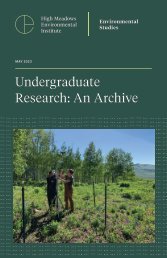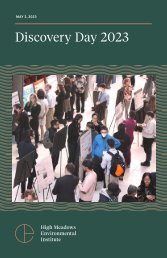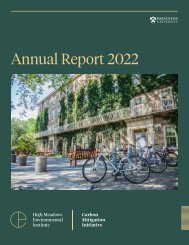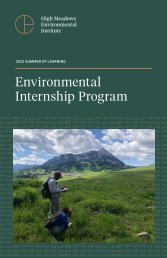CMI Annual Report 2021
Create successful ePaper yourself
Turn your PDF publications into a flip-book with our unique Google optimized e-Paper software.
full sunlight but die quickly in shade from those that grow<br />
slowly in the sun but survive in the shade. The researchers<br />
showed that this tradeoff can maintain the coexistence of a<br />
theoretically infinite number of species.<br />
Relevance to bp<br />
Some scientists argue that forest carbon storage would be<br />
maximized by offsets projects that promote rapidly growing<br />
species, so that carbon is stored quickly. Others advocate trees<br />
capable of attaining very large size, which maximizes the total<br />
amount of carbon that will ultimately be stored. Giant, rapidly<br />
growing, but shade intolerant trees, like members of the<br />
tropical genus Ceiba, offer both attributes – rapid growth and<br />
large total carbon storage. The analysis shows that stands<br />
composed of both these giants and slow growing shade<br />
tolerant species will store more carbon than either type in pure<br />
stands. This is because the shade tolerant species form an<br />
extensive carbon-storing subcanopy beneath the giant species<br />
(Figure 10.1). More surprisingly, when a multispecies forest is<br />
co-managed for biodiversity and carbon storage, the shade<br />
tolerant species allow the forest to store carbon after a<br />
disturbance that destroys the canopy trees, because their high<br />
low-light survival means that many are waiting in the<br />
understory to rapidly restore the canopy. Thus, the biodiverse<br />
forest will both store more carbon and increase resilience by<br />
restoring lost carbon faster after disturbance.<br />
Figure 10.1.<br />
Diagram of a<br />
multilayered tropical<br />
forest with giant<br />
shade intolerant<br />
species on top and<br />
adult shade tolerant<br />
species and young<br />
trees beneath.<br />
(logicalclass.com/<br />
contant/view/1040)<br />
Carbon Mitigation Initiative Twenty-first Year <strong>Report</strong> <strong>2021</strong><br />
44
















